Gathering Documentation for your Personal Injury Claim

Suppose you were hurt in an unintentional injury accident. In that case, you may have sustained several costly losses like having to pay for medical treatment for injuries and physical bodily harm you suffered and for the bills you received for replacement or repairs to personal property that was damaged. At the same time, you were unable to work, so you lost your income.
Your personal injury claim should account for all of the losses you had to endure. When you work with an attorney, you will have someone on your side who will be able to identify the entirety of your losses and assess their value.
Once your attorney has determined what your claim is worth, they will send a demand letter to the insurance company. The insurance company can either accept the amount listed in the demand letter, reject it, or counter it. To improve the chances of getting the most from your claim, you will need substantial evidence to show the extent of the losses you sustained.
For questions about the personal injury claims process and for legal representation, you are welcome to call the Canton personal injury attorney at the Law Office of Brian S. Karpe.
Tips to Find and Gather Evidence for Your Personal Injury Claim
There are several types of documentation that can be used as evidence to support your claim. And, it is better to have more versus less. Robust evidence showing how much harm you endured along with detailing that another party was negligent and responsible for causing your accident will put you in an optimal position to be successful and recover the full amount of compensation you are owed.
These tips can help you amass the evidence you need to support your personal injury claim:
- Don’t delay and wait too long when starting the claims process. The statute of limitations for a personal injury claim in Connecticut is only two years from when the injury accident happened. When you start the claims process soon after your accident, you can start collecting evidence. Evidence is better preserved and more plentiful right after an accident. If you wait too long, the strength of evidence and its availability is reduced.
- Check with the local police station to obtain a copy of the police report.
- If you have the capacity to move around and take pictures after an accident, take as many as you can of the accident scene, the destruction the accident caused, and the environment on the day that the accident happened.
- If you see any bystanders, they could have seen what happened. You should talk to them and ask them if they would provide their contact information as a witness.
- Make sure to see a medical doctor as soon as you can after an accident, even if you don’t think you are hurt. Remember to keep all documentation related to your medical appointment and the doctor’s feedback regarding your diagnosis.
- Keep and organize all invoices that come about from your accident.
- Consult with your attorney about what additional evidence, like expert testimony, for example, can be used to support your claim.
Speak to a Connecticut Personal Injury Attorney Today
Identifying and collecting evidence is essential to any successful personal injury claim. If you would like assistance with your claim, please call our Connecticut personal injury attorney at the Law Office of Brian S. Karpe at 860-217-1458 to schedule a free consultation.
Source:
cga.ct.gov/current/pub/chap_926.htm
